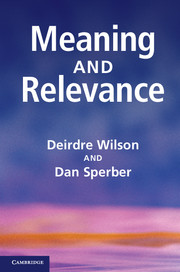Book contents
- Frontmatter
- Contents
- Figures
- Tables
- Preface
- Acknowledgements
- 1 Introduction
- Part I Relevance and Meaning
- Part II Explicit and Implicit Communication
- 7 Linguistic form and relevance
- 8 Pragmatics and time
- 9 Recent approaches to bridging
- 10 Mood and the analysis of non-declarative sentences
- 11 Metarepresentation in linguistic communication
- Part III Cross-Disciplinary Themes
- Notes
- References
- Index
7 - Linguistic form and relevance
Published online by Cambridge University Press: 05 June 2012
- Frontmatter
- Contents
- Figures
- Tables
- Preface
- Acknowledgements
- 1 Introduction
- Part I Relevance and Meaning
- Part II Explicit and Implicit Communication
- 7 Linguistic form and relevance
- 8 Pragmatics and time
- 9 Recent approaches to bridging
- 10 Mood and the analysis of non-declarative sentences
- 11 Metarepresentation in linguistic communication
- Part III Cross-Disciplinary Themes
- Notes
- References
- Index
Summary
Introduction
Our book Relevance (Sperber and Wilson 1986a) treats utterance interpretation as a two-phase process: a modular decoding phase is seen as providing input to a central inferential phase in which a linguistically encoded logical form is contextually enriched and used to construct a hypothesis about the speaker’s informative intention. Relevance was mainly concerned with the inferential phase of comprehension: we had to answer Fodor’s challenge that while decoding processes are quite well understood, inferential processes are not only not understood, but perhaps not even understandable (see Fodor 1983). Here we will look more closely at the decoding phase and consider what types of information may be linguistically encoded, and how the borderline between decoding and inference can be drawn.
It might be that all linguistically encoded information is cut to a single pattern: all truth conditions, say, or all instructions for use. However, there is a robust intuition that two basic types of meaning can be found. This intuition surfaces in a variety of distinctions: between describing and indicating, stating and showing, saying and conventionally implicating, or between truth-conditional and non-truth-conditional, conceptual and procedural, or representational and computational meaning. In the literature, justifications for these distinctions have been developed in both strictly linguistic and more broadly cognitive terms.
- Type
- Chapter
- Information
- Meaning and Relevance , pp. 149 - 168Publisher: Cambridge University PressPrint publication year: 2012
- 7
- Cited by



